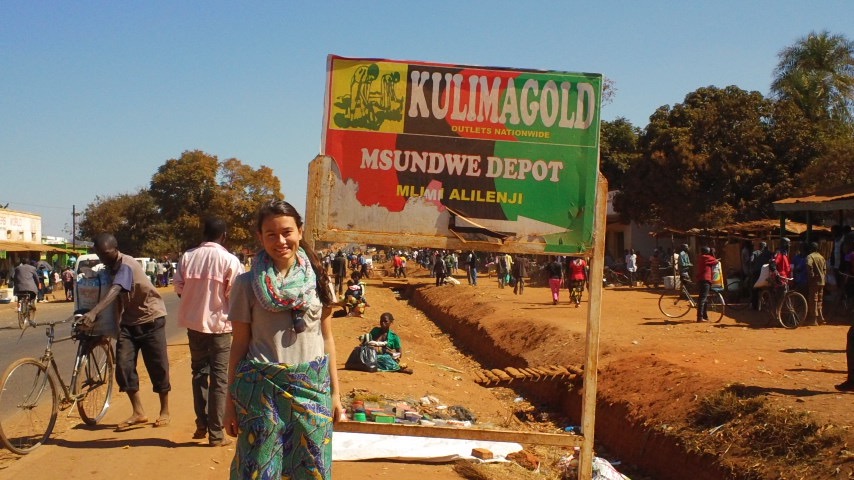On Saturday we decided to venture outside the CLI walls and check out the market in Msundwe. It’s about a 90 minute walk on a single red dirt road.
I asked our chef Fred for advice and he said to ‘focus’ because of all the attention we’d get.
It wasn’t the first time I’d gotten caught up in a Mzungu parade, but this was definitely my most overwhelming. Over the course of the walk around 100 children joined us, shouting ‘Azunugu!’ (the plural version of Mzungu, ‘white person’) and asking for money, footballs, etc. I felt bad because it was disruptive to people trying to bike their loads down the road or taxi passengers between villages.

Our new friends were sweet but it was a bummer that they seemed to perceive all white people as gift dispensers. The people who run CLI know about sustainable giving, but it seems like many of the visitors here haven’t really upheld that philosophy. We tried making friends with them and showing our human sides, connecting with them as best we could across the language barrier. But they were super persistent on asking for our bags, sunglasses, even a pen in Julika’s pocket. They broke off pleasantly, though, even after we held our ground. Julia told them ‘stay in school and you’ll get to buy your own pen!’ They seemed to really enjoy practicing their English with us.
When we got to the market some of the adults helped shoo away the children so we could have some breathing room. We said Zikomo about ten times and got to shopping. I immediately got a wrap to wear around my waist—the proper dress for Malawian women. I got help putting in on and struggled keeping it there the rest of my time there.
I picked up some containers I needed for the site, some ‘fritters’— round donut-like things I saw our research team having for breakfast last week, and another cloth to wear as a wrap or put down in the grass to sit outside when I’m on site.

I loved seeing rows and rows of bikes, and a station with a welder who fixed bikes on the spot with a giant tank just standing alone all forboding.
The people were all nice and one woman saw me carrying the containers on my hip and insisted I put them on my head. I lasted around 30 seconds before bruising myself, and my containers were empty.
On the way back we stopped at the ‘beer garden’ which turned out to be a desolate, plant-less compound with a few men and their booze. They were a little too happy to see us and we knew we needed to make it quick. Araceli, the head of hospitality at CLI, told us there was a stout beer that was common in the area, and I wanted to try it. No stout, but there was Shake Shake, a brand of the “village beer” Chibuku. A man we passed at the market insisted we try his, and we politely declined but figured this was an opportunity to try it out.
We started home and when the children broke off near the end of the trip, we took a break and tried it. I opened it and realized the connection to a ‘shake’ and why it might be in a carton. The beer was completely unfiltered, with chunks of the grain floating around in a gritty white liter of heterogeneous fluid. It actually didn’t taste as bad as it looked, it was quite sour and, as legend has it, supposedly had a pretty high alcohol content without the risk of a hangover. By the time we tried it though, it was shaken up from my walk and gotten warm. I poured the rest out and we carried on right before some CLI visitors happened to drive by and pick us up. With more than 2 hours of walking under our belts we were happy to give our dirty, blistered feet some relief.
For more information about Chibuku, I highly recommend these colorful reviews on Rate Beer.
Have a great weekend everyone, tionana (see you later)!



